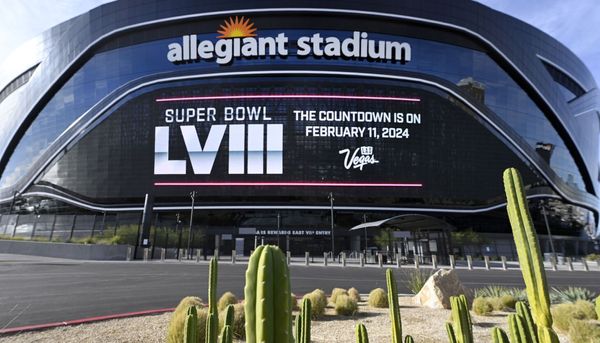
A roundup of some of the most popular but completely untrue stories and visuals of the week. None of these are legit, even though they were shared widely on social media. The Associated Press checked them out. Here are the facts:
___
UN, WEF agenda won’t force people to live in ‘smart cities’
CLAIM: Governments can “forcibly remove” people living on polluted land or water and require them to live in “smart cities” under a plan from the World Economic Forum and United Nations called Agenda 2030.
THE FACTS: The U.N.’s 2030 Agenda for Sustainable Development, which the World Economic Forum is helping to implement, does not discuss removing people from their homes nor “smart cities.” And neither organization has the ability to grant governments such power. Social media users are falsely claiming that the U.N. plan will give governments the power to uproot people and force them to live in specific cities, with some baselessly tying this supposed scheme to the recent burning of toxic chemicals at the site of a train derailment in East Palestine, Ohio. “The sickos at the UN/WEF plan to confiscate all polluted land and force the people into smart cities,” one recent tweet reads. “Resist. Make people aware. Wake up!! #Agenda2030.” But Agenda 2030 does nothing of the sort. The plan was adopted in 2015 by the U.N. General Assembly. In 2019, the U.N. and the WEF signed an agreement that outlines ways the organizations can work together in order to more quickly implement Agenda 2030’s goals. The agenda strives for universal peace and prosperity over a 15-year period, with 17 broad goals such as “End poverty in all its forms everywhere” and “Make cities and human settlements inclusive, safe, resilient and sustainable.” Multiple goals, including the latter, cite reducing pollution as an aim. But the agenda does not direct nor give governments any new ability to dictate where people live. “It does mention that one of the goals is to reduce the adverse impact of cities on the environment with measures like improving waste management and air quality, but at no point does it talk about removing people from their land even if this is polluted,” Florencia Soto Niño, a U.N. spokesperson, wrote in an email to the AP. Soto Niño also pointed out that the document does not even mention the term “smart cities.” Other U.N.initiatives have used the phrase, but the term is generally just used to refer to cities that utilize technology to improve operations. The term “smart cities” has proliferated recently alongside misinformation about so-called “15-minute cities,” which people have falsely claimed are designed to confine residents to their neighborhoods. Yann Zopf, a World Economic Forum spokesperson, also said in a statement that the aforementioned claims about Agenda 2030 are false.
— Associated Press writer Melissa Goldin in New York contributed this report.
___
Social posts revive false claim about Haley’s name
CLAIM: Republican presidential candidate Nikki Haley “changed” her name for political reasons.
THE FACTS: The former United Nations ambassador has long used her legal middle name, Nikki. She was given the name Nimarata Nikki Randhawa at birth. Haley is her married name. Haley announced her run for president last week, making the former South Carolina governor the first major challenger to former President Donald Trump for the 2024 Republican nomination. In the days following her announcement, social media users amplified a long-circulating falsehood that Haley changed her name in order to appeal to Republican voters. Other posts claimed that Nimarata Randhawa was her “real name,” suggesting Nikki Haley was not. But while Haley’s legal first name is indeed Nimarata, sometimes spelled as Nimrata, her middle name is Nikki — a name that her family called her growing up and that means “little one” in Punjabi, as the AP has reported. Haley’s campaign told the AP in a statement that “Amb. Haley has gone by her middle name Nikki since she was born.” Haley herself addressed claims about her name in a 2018 tweet, writing: “Nikki is my name on my birth certificate. I married a Haley. I was born Nimarata Nikki Randhawa and married Michael Haley.” There are records showing that Haley used her middle name long before she entered politics in 2004, when she was elected to the South Carolina House of Representatives. The Times and Democrat, a local newspaper in South Carolina, reported in September 1984 that “Nikki Randhawa” would play a role in a local production of the musical “Li’l Abner.” The newspaper again identified her using the same name nearly a decade later, in an October 1995 photo spread reporting on her family’s clothing business. Haley and her husband, W. Michael Haley, married the following year, in 1996. In 2003, Haley was identified as “Nikki Randhawa-Haley” while serving on the board of the Lexington Chamber of Commerce in South Carolina, an archived page shows.
— Associated Press writer Angelo Fichera in Philadelphia contributed this report.
___
Soros did not endorse DeSantis in 2024 presidential race
CLAIM: George Soros endorsed Florida Gov. Ron DeSantis as the Republican nominee for the 2024 presidential election.
THE FACTS: During a keynote address ahead of last week’s Munich Security Conference, Soros said he hopes for a scenario in which DeSantis runs for and wins the Republican nomination so that former President Donald Trump will run as a third-party candidate, paving the way for “a Democratic landslide.” He did not express personal support for DeSantis as a political candidate. “My hope for 2024 is that Trump and Governor DeSantis of Florida will slug it out for the Republican nomination,” Soros says in the clip. “Trump has turned into a pitiful figure, continually bemoaning his loss in 2020. Big Republican donors are abandoning him in droves. DeSantis is shrewd, ruthless and ambitious. He’s likely to be the Republican candidate.” Posts on Twitter claiming Soros had “endorsed” DeSantis, some of which were shared by prominent Republicans, garnered tens of thousands of likes and shares. But the full version of Soros’ address, which he gave Feb. 16 as part of a speaker series at the Technical University of Munich, makes clear that Soros only hopes DeSantis will be the Republican nominee so that Democrats will have a clear path to victory. After predicting that DeSantis will win the nomination in the clip that was shared widely on social media, the full video shows Soros saying: “This could induce Trump, whose narcissism has turned into a disease, to run as a third-party candidate. That would lead to a Democratic landslide and force the Republican Party to reform itself. But perhaps I may be just a little bit biased.” Laura Silber, a spokesperson for Soros' Open Society Foundations, told the AP that claims alleging Soros endorsed DeSantis are not true. “Mr. Soros predicted that Gov. DeSantis ‘is likely to be the Republican candidate’ for president in 2024 — a prediction, not an endorsement,” she wrote in an email.
— Melissa Goldin
___
Vinyl chloride draft report didn’t omit info on cancer, children
CLAIM: The Centers for Disease Control and Prevention removed information from its toxicological profile for vinyl chloride about how dangerous the gas is in regards to children, drinking water and cancer.
THE FACTS: While a new toxicological profile released as a draft this month has been reformatted from the prior version, it does not omit such information nor downplay the dangers of vinyl chloride. In the weeks following the Feb. 3 freight train derailment in Ohio that prompted officials to intentionally release and burn toxic vinyl chloride from five rail cars, a variety of conspiratorial claims about a government document on the gas have spread online. The prior vinyl chloride toxicological profile was released in 2006, and the CDC’s Agency for Toxic Substances and Disease Registry released a draft of an updated edition in February, which some baselessly asserted was suspicious timing. Others went a step further to claim that the new version leaves out unspecified information about how the gas, which is used to make plastic products, impacts children, drinking water and cancer. But a comparison of the new draft with the 2006 version shows that while the new report has been significantly reformatted – with some chapters and subsections changed — both documents contain the same information about children, drinking water and cancer, even if not in the same places. Experts who reviewed the two reports concurred. “It’s just in a different format,” said Stephen Roberts, professor emeritus with the University of Florida and former director of the Center for Environmental and Human Toxicology. “There’s plenty of information in that profile about how dangerous vinyl chloride is. I don’t think that it plays down that aspect at all.” For instance, the new draft omits a two-paragraph subsection titled “How Can Vinyl Chloride Affect Children?” But the new draft doesn’t leave out critical research concerning the dangers of vinyl chloride, and discussion of children’s susceptibility to the toxic effects of vinyl chloride are discussed at length elsewhere in the new draft. Both the new draft and the older version feature subsections devoted to vinyl chloride’s association with cancer, as well as references to the potential for children to be exposed to vinyl chloride through drinking water. “All the information is still in there,” said Michael Kleinman, an adjunct professor of environmental and occupational health at the University of California, Irvine. “They haven’t really changed the final conclusions.” The new draft updates the 2006 version with the latest information published in scientific literature, Kristen Nordlund, a spokesperson for the CDC, wrote in an email to the AP. Nordlund said the agency has been working on the update to the vinyl chloride report over the past year and made it available for public comment on Feb. 9, 2023. The process is “not related to the emergent situation in East Palestine,” she wrote.
— Associated Press writer Josh Kelety in Phoenix contributed this report.
___
Photos, videos of dead birds are unrelated to Ohio derailment
CLAIM: A photo shows birds that “dropped dead” in Kentucky following the Ohio train derailment, and a video shows birds in northern Indiana that also died from the hazardous chemicals released after the derailment.
THE FACTS: The photo, which shows several birds lying dead on a road, was taken in Little Rock, Arkansas, in 2018 and published in an article by the Arkansas Democrat-Gazette. The video misrepresents a clip of dead birds near New Carlisle, Indiana. Social media posts sharing photos and videos of dead birds in states beyond Ohio are spreading with false claims that the deaths are related to the recent burning of toxic chemicals following the Ohio derailment. A Facebook user shared the photo supposedly showing birds in Kentucky, falsely claiming the incident was related. A reverse image search shows that the photo was featured in an article published by the Arkansas Democrat-Gazette on April 9, 2018. The photo’s caption states that several dead birds were found near an intersection in downtown Little Rock that month. A local ornithologist told the paper that the birds likely ate fermented berries, which can intoxicate them, causing them to fall and die. Meanwhile, the widely shared video shows a flock of birds hanging side-by-side on a power line upside down, some with their beaks open. More birds can be seen lying on the ground. But the original video appeared on Facebook nearly two weeks before the derailment, making it impossible for the two incidents to be related. Shelly Lister Struss, a resident of Buchanan, Michigan, posted the video on Jan. 22. She confirmed to the AP that she was the one who filmed it, about 2 miles (3 kilometers) outside of the center of New Carlisle, Indiana. While the death of these birds was not due to the derailment, experts were uncertain of the precise cause. Marty Benson, a spokesperson for the Indiana Department of Natural Resources, told the AP that although the DNR “has not been on the site of this incident,” it is possible the birds “suffered electrocution from a power surge on the line.” Michael Bianski, a spokesperson for Indiana Michigan Power Co., said that a more plausible explanation is a phenomenon called conductor, or line, gallop — the sudden, rapid movement of power lines caused by wind gusts. “This can kill birds perched on power lines as whiplash from the motion can break their necks,” he wrote in an email to the AP.
— Associated Press writers Karena Phan in Los Angeles and Ali Swenson and Melissa Goldin in New York contributed to this report.
___
Find AP Fact Checks here: https://apnews.com/APFactCheck










